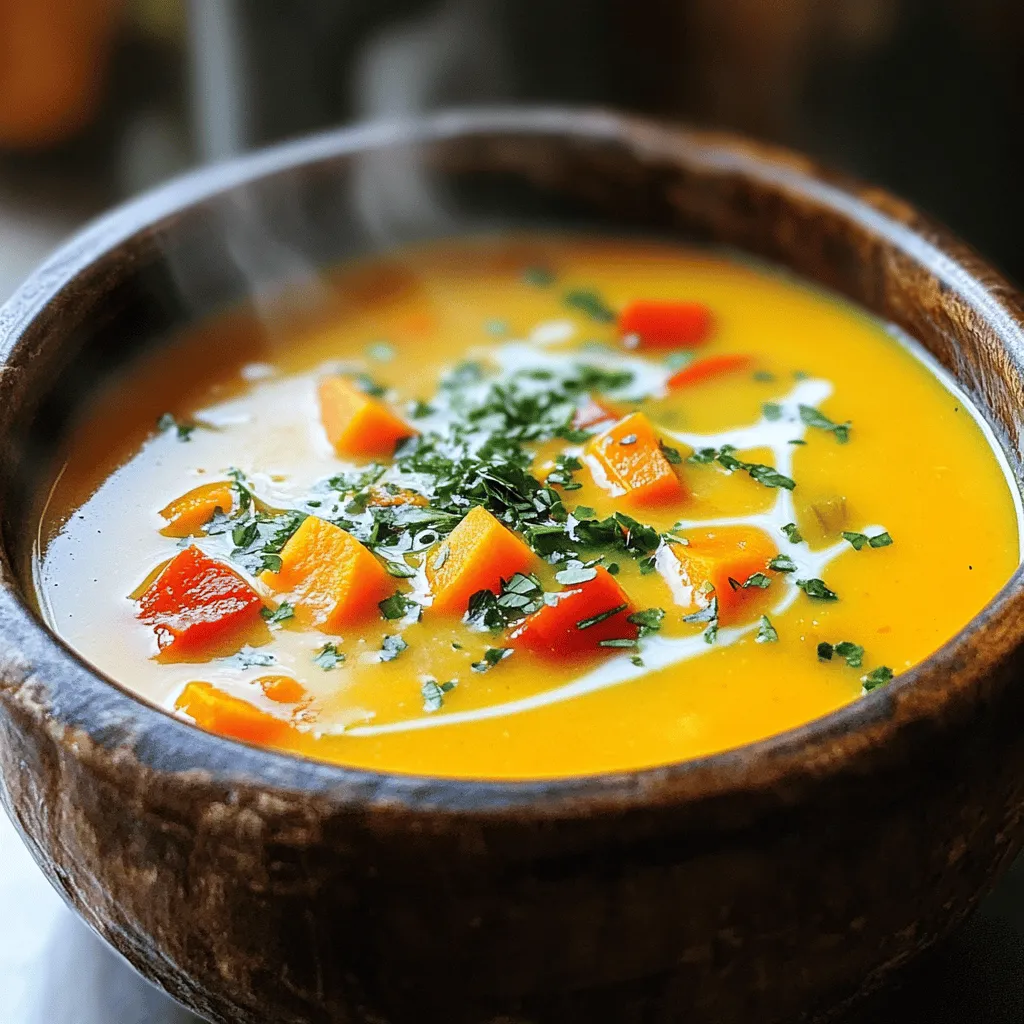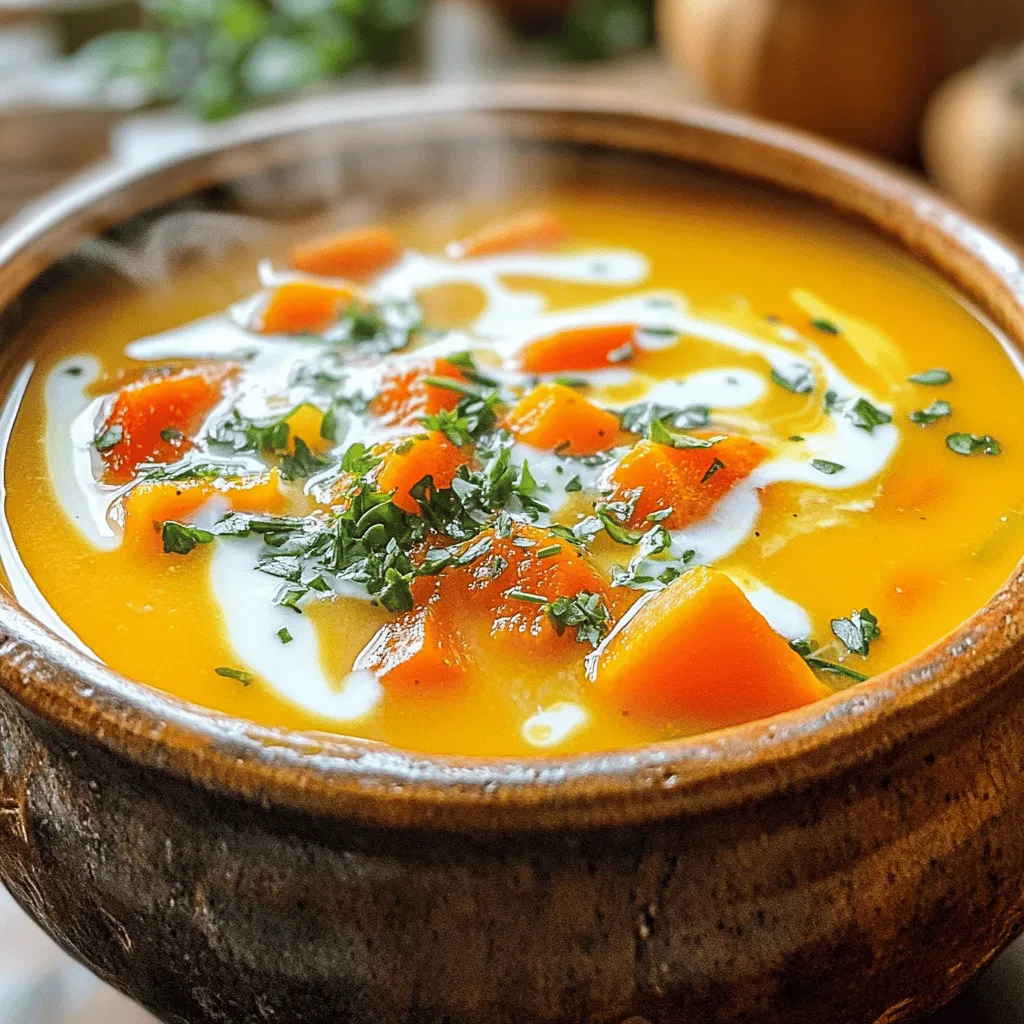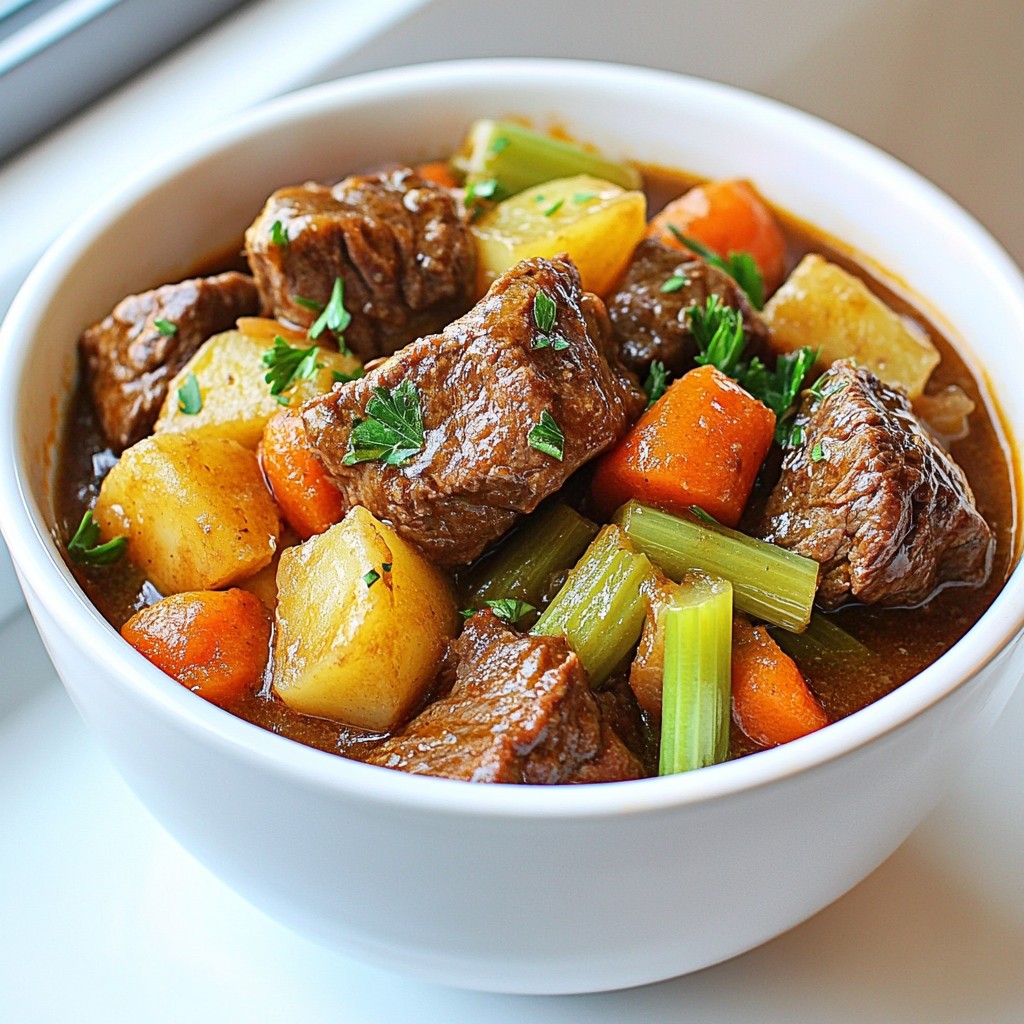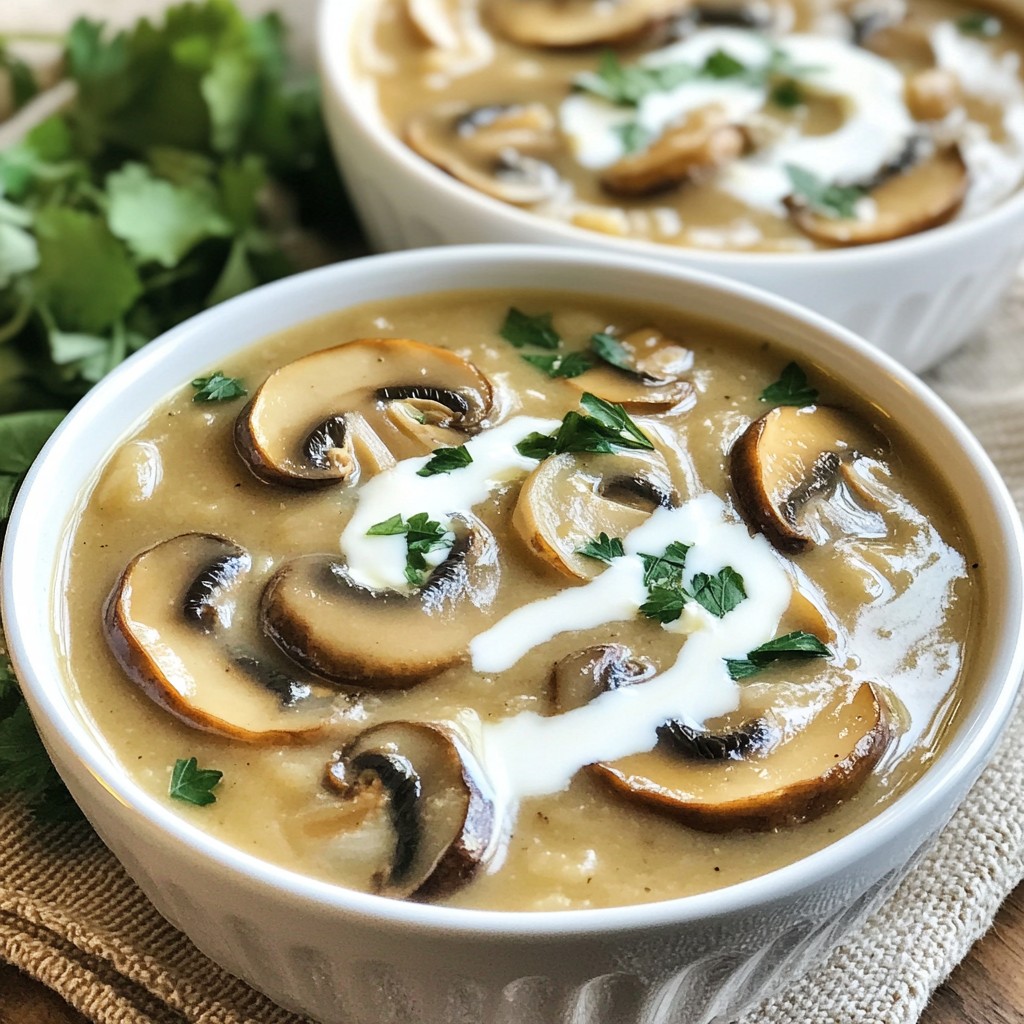Looking for a warm, creamy dish that comforts and fuels you? My Silky Roasted Vegetable Soup is both nourishing and easy to make! Packed with vibrant veggies like carrots and butternut squash, this soup blends rich flavors with a velvety texture. Join me as we explore the simple steps to create this delightful dish, perfect for any time of the year. Let’s dive in and get cooking!
Ingredients
Main Ingredients for Silky Roasted Vegetable Soup
– 2 cups carrots, chopped
– 2 cups butternut squash, peeled and cubed
– 1 red bell pepper, chopped
– 1 medium onion, chopped
– 4 cloves garlic, peeled
Additional Ingredients
– 3 tablespoons olive oil
– 4 cups vegetable broth
– 1 teaspoon dried thyme
– 1 teaspoon smoked paprika
– Salt and pepper, to taste
– ½ cup coconut milk (for creaminess)
– Fresh herbs (like basil or parsley) for garnish
This soup starts with fresh veggies. Carrots add sweetness. Butternut squash brings a creamy texture. Red bell pepper gives a nice color and flavor. Onion and garlic add a savory depth.
Next, we add olive oil. It helps the veggies roast well and adds richness. Then, we pour in vegetable broth. This broth is key for a great base.
Dried thyme and smoked paprika add layers of flavor. Salt and pepper are needed to enhance all the tastes. Lastly, coconut milk makes the soup creamy. Fresh herbs like basil or parsley will brighten up each bowl.
Gather these ingredients, and you’ll be on your way to a warm, healthy dish. Each element works together to create a silky, delicious soup.
Step-by-Step Instructions
Preparation Steps
1. Preheat the Oven
Start by setting your oven to 400°F (200°C). Preheating ensures even cooking.
2. Combine & Coat Vegetables
In a large bowl, mix the chopped carrots, butternut squash, red bell pepper, onion, and garlic. Add 3 tablespoons of olive oil. Sprinkle in 1 teaspoon of dried thyme, 1 teaspoon of smoked paprika, salt, and pepper. Toss everything well until the veggies are coated.
3. Spread Vegetables on Baking Sheet
Line a baking sheet with parchment paper. Spread the coated vegetables evenly on the sheet. This helps them roast nicely.
Cooking Steps
1. Roast Vegetables
Place the baking sheet in the oven. Roast for 30-35 minutes. Stir halfway through to get an even roast. The veggies should be tender and slightly brown.
2. Transfer to Pot with Broth
Once roasted, move the vegetables to a large pot. Pour in 4 cups of vegetable broth. This adds flavor and helps with blending.
3. Simmer
Heat the pot over medium heat. Bring the mixture to a simmer. This allows the flavors to meld together perfectly.
Blending the Soup
1. Use of Immersion Blender
For a smooth texture, use an immersion blender. Blend the soup right in the pot until it’s silky and smooth.
2. Traditional Blender Method
If you don’t have an immersion blender, pour the soup into a regular blender. Blend in batches until smooth, then return it to the pot.
Final Touches
1. Stir in Coconut Milk
Add ½ cup of coconut milk to the blended soup. This gives it a creamy, rich flavor.
2. Adjust Seasoning
Taste the soup and add more salt and pepper if needed. This step ensures the soup is just right for you.
Tips & Tricks
Enhancing Flavor
– Use Fresh Herbs: Fresh herbs like basil and parsley add a bright taste to the soup. I love adding them right before serving for a fresh kick. You can also mix in some thyme while cooking for a warm flavor.
– Experiment with Spices: Don’t be afraid to try new spices. Add a pinch of cumin or coriander to create a unique twist. A dash of chili powder can bring some heat, too.
Achieving the Perfect Texture
– Importance of Roasting Time: Roasting the veggies brings out their natural sweetness. Make sure to roast them until they are tender and caramelized. This step is key for a rich and deep flavor. Aim for 30-35 minutes in a hot oven.
– Blending Techniques: For a silky smooth soup, use an immersion blender. This tool makes it easy to blend right in the pot. If you use a regular blender, do it in small batches and be careful with the hot soup.
Presentation Suggestions
– Garnishing Ideas: A drizzle of coconut milk on top adds creaminess and a fun swirl. Fresh herbs not only add taste but also make the soup look vibrant.
– Serving Suggestions: Serve the soup in warm bowls. Pair it with crusty bread for dipping. This makes it a cozy meal for any time of the year.

Variations
Ingredient Swaps
Other Vegetables to Consider
You can switch up the veggies in this soup. Try adding:
– Sweet potatoes
– Zucchini
– Cauliflower
– Leeks
These will change the taste and keep it interesting.
Dairy-Free Alternatives
If you want a dairy-free option, use:
– Almond milk
– Cashew cream
– Soy milk
These keep the soup creamy without dairy.
Flavor Variations
Adding Heat (Chili Peppers)
For a spicy kick, add chili peppers. You can use:
– Jalapeños
– Serrano peppers
– Red pepper flakes
Start with a small amount and taste as you go.
Incorporating Different Herbs
Change the herbs to boost flavor. Some good choices are:
– Rosemary
– Oregano
– Cilantro
Each herb gives a unique taste to the soup.
Seasonal Variations
Fall Favorites
In the fall, use seasonal veggies like:
– Pumpkin
– Parsnips
– Apples
These add warmth and sweetness to your soup.
Spring Vegetable Options
In spring, bright vegetables work well. Consider using:
– Asparagus
– Peas
– Spinach
These will add color and freshness to your dish.
Storage Info
Storing Leftovers
– Refrigeration Tips: Place the soup in an airtight container. This keeps it fresh. It can last up to four days in the fridge. Make sure it cools down before sealing.
– Freezing Options: You can freeze this soup for up to three months. Use freezer-safe containers. Leave some space at the top to allow for expansion. Thaw it in the fridge overnight when you’re ready to eat.
Reheating Instructions
– Best Practices for Reheating: The best way to reheat is on the stove. Pour the soup into a pot and warm over low heat. Stir often to avoid burning.
– Maintaining Texture and Flavor: If the soup seems thick, add a splash of vegetable broth or water. This helps keep it silky. Adjust seasoning if needed, to enhance the flavor.
Shelf Life
– How Long Does it Last?: In the fridge, this soup lasts about four days. In the freezer, it stays good for three months.
– Signs of Spoilage: If you see mold or a weird smell, it’s time to toss it. A change in color is also a sign. Always trust your senses when it comes to food safety.
FAQs
Common Questions
What vegetables can I add to this soup?
You can add many veggies to this soup. Try sweet potatoes, zucchini, or even cauliflower. Each will add a new twist and flavor. Just chop them up and roast as usual.
Can I make this soup in advance?
Yes, you can make this soup ahead of time. Store it in the fridge for up to four days. Just reheat it before serving.
Is Silky Roasted Vegetable Soup suitable for freeze?
Definitely! This soup freezes well. Let it cool, then store it in a freezer-safe container. It will keep for about three months.
Cooking Techniques
Can I use a regular blender instead of an immersion blender?
You can use a regular blender. Just be careful when blending hot soup. Blend in small batches to avoid spills.
How do I know when the vegetables are done roasting?
The veggies are done when they are tender and slightly caramelized. You should see some browning on the edges. Stir halfway through roasting for even cooking.
Substitutions and Dietary Needs
How to make it gluten-free?
This soup is naturally gluten-free. Just confirm that your vegetable broth is gluten-free. Most brands are safe, but check the label.
Can I use chicken broth instead of vegetable broth?
Yes, you can use chicken broth. It adds a deeper flavor to the soup. Just make sure to adjust the salt, as chicken broth can be saltier than vegetable broth.
This blog post covered how to make Silky Roasted Vegetable Soup. We explored the main and additional ingredients that bring great flavor. You learned step-by-step instructions and tips for perfecting your soup. Variations and storage options help you adapt the recipe to your needs.
Now, with this knowledge, you can create a delicious, comforting soup anytime. Enjoy the process and make it your own! Trust me, simple steps can lead to great meals.




